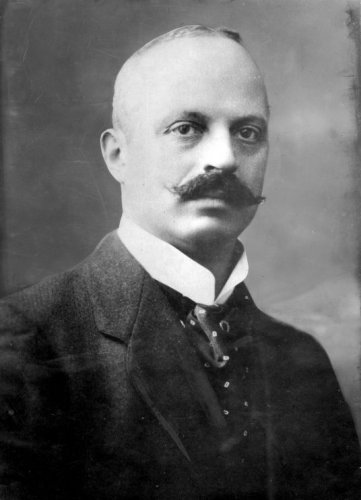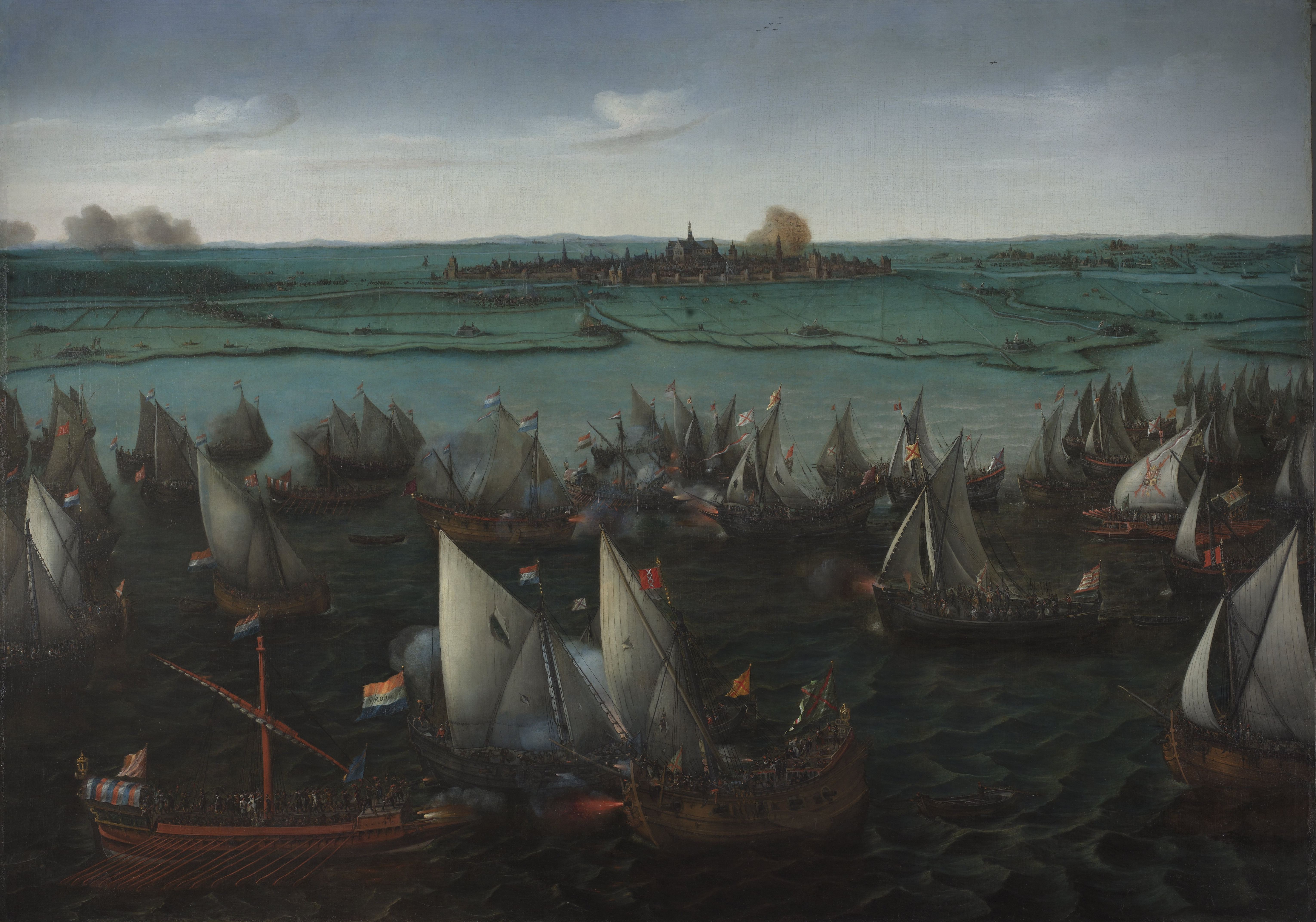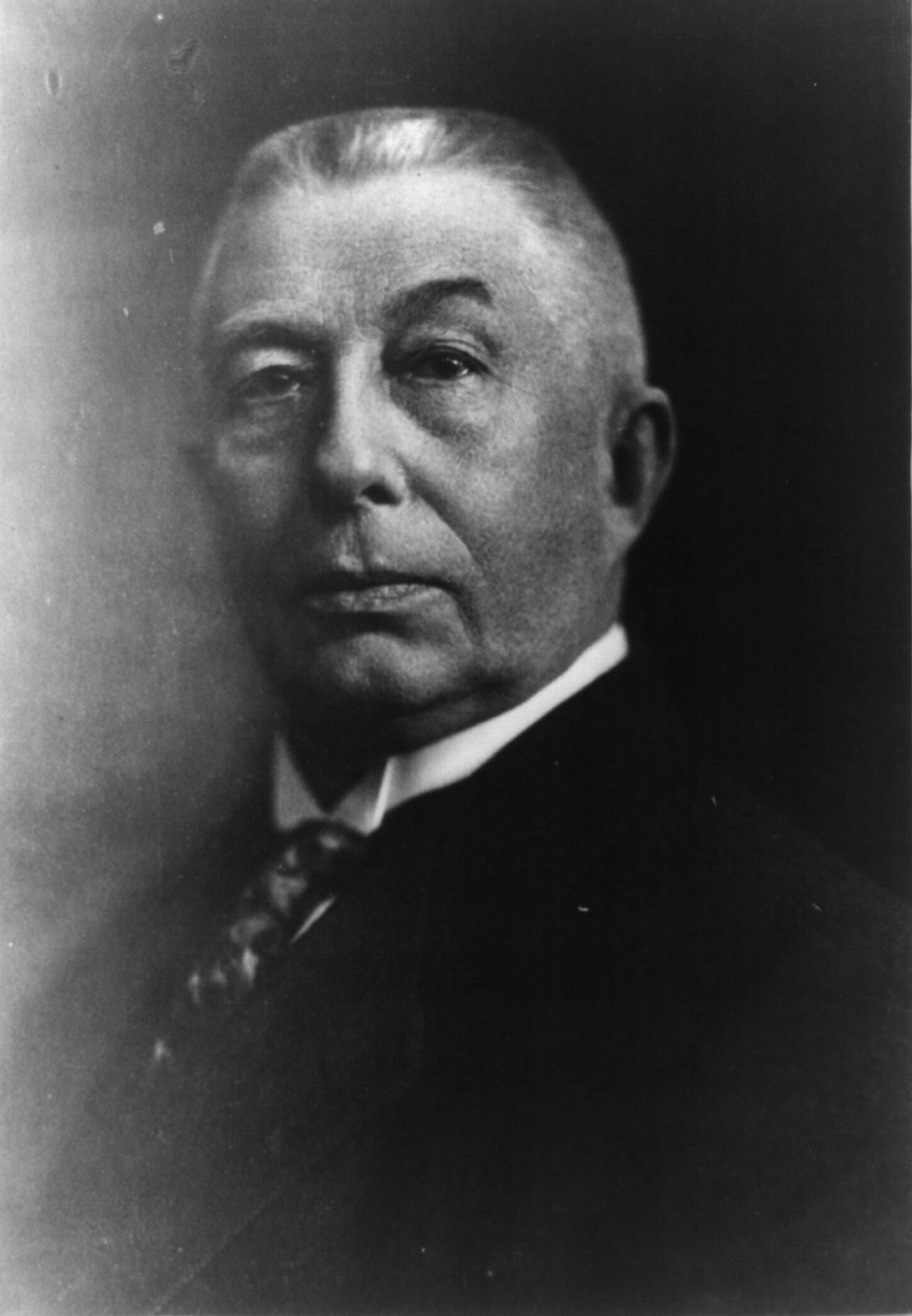|
Hervormd Gereformeerde Staatspartij
The Hervormd Gereformeerde Staatspartij (in English: Reformed Reformed State Party (see below), HGS) was a Dutch orthodox Protestant political party during the interbellum. For its orthodox political ideals and its refusal to cooperate in any cabinet, the party is called a testimonial party. Party history The HGS was founded in 1921 as split from the Protestant Christian Historical Union. The party's support for female suffrage and the Catholic/Protestant coalition were important reasons for the split. The direct reasons was a series of demonstrations held in Amsterdam by orthodox Protestants, who opposed the lifting of the ban on Catholic processions in the Northern provinces. The movement had called itself the June Movement, a reference to the April movement which was crucial in the formation of the first Protestant party, the ARP. A driving force in the split had been the minister Casper Lingbeek. The split is very similar to the split of the orthodox Protestant SGP from t ... [...More Info...] [...Related Items...] OR: [Wikipedia] [Google] [Baidu] |
Name
A name is a term used for identification by an external observer. They can identify a class or category of things, or a single thing, either uniquely, or within a given context. The entity identified by a name is called its referent. A personal name identifies, not necessarily uniquely, a ''specific'' individual human. The name of a specific entity is sometimes called a proper name (although that term has a philosophical meaning as well) and is, when consisting of only one word, a proper noun. Other nouns are sometimes called "common names" or (obsolete) "general names". A name can be given to a person, place, or thing; for example, parents can give their child a name or a scientist can give an element a name. Etymology The word ''name'' comes from Old English ''nama''; cognate with Old High German (OHG) ''namo'', Sanskrit (''nāman''), Latin ''Roman naming conventions, nomen'', Greek language, Greek (''onoma''), and Persian language, Persian (''nâm''), from the Proto-Indo ... [...More Info...] [...Related Items...] OR: [Wikipedia] [Google] [Baidu] |
1933 Dutch General Election
General elections were held in the Netherlands on 26 April 1933. Dieter Nohlen & Philip Stöver (2010) ''Elections in Europe: A data handbook'', p1395 The Roman Catholic State Party remained the largest party in the House of Representatives, winning 28 of the 100 seats.Nohlen & Stöver, p1412 Results References {{Dutch general elections General elections in the Netherlands Netherlands ) , anthem = ( en, "William of Nassau") , image_map = , map_caption = , subdivision_type = Sovereign state , subdivision_name = Kingdom of the Netherlands , established_title = Before independence , established_date = Spanish Netherl ... 1933 in the Netherlands April 1933 events 1933 elections in the Netherlands ... [...More Info...] [...Related Items...] OR: [Wikipedia] [Google] [Baidu] |
Ten Commandments
The Ten Commandments (Biblical Hebrew עשרת הדברים \ עֲשֶׂרֶת הַדְּבָרִים, ''aséret ha-dvarím'', lit. The Decalogue, The Ten Words, cf. Mishnaic Hebrew עשרת הדיברות \ עֲשֶׂרֶת הַדִּבְּרוֹת, ''aséret ha-dibrót'', lit. The Decalogue, The Ten Words), are a set of Divine law, biblical principles relating to ethics and worship that play a fundamental role in Judaism and Christianity. The text of the Ten Commandments appears twice in the Hebrew Bible: at Book of Exodus, Exodus and Book of Deuteronomy, Deuteronomy . According to the Book of Exodus in the Torah, the Ten Commandments were revealed to Moses at Mount Sinai (Bible), Mount Sinai and inscribed by the finger of God on two Tablets of Stone, tablets of stone kept in the Ark of the Covenant. Scholars disagree about when the Ten Commandments were written and by whom, with some modern scholars suggesting that they were likely modeled on Hittites, Hittite and Mesop ... [...More Info...] [...Related Items...] OR: [Wikipedia] [Google] [Baidu] |
Roman Catholicism In The Netherlands
, native_name_lang = , image = Catharijnekerk Utrecht.jpg , imagewidth = 200px , alt = , caption = St Catherine's Cathedral, Utrecht. , abbreviation = , type = National polity , main_classification = Catholic , orientation = , scripture = , theology = , polity = , governance = Episcopal , structure = , leader_title = Pope , leader_name = Pope Francis , leader_title1 = President , leader_name1 = Bishop Hans van den Hende , leader_title2 = Primate , leader_name2 = Archbishop Wim Eijk , leader_title3 = Apostolic Nuncio , leader_name3 = Aldo Cavalli , fellowships_type = , fellowships = , fellowships_type1 = , fellowships1 = , division_type = , division = , division_type1 = , division1 = , division_type2 ... [...More Info...] [...Related Items...] OR: [Wikipedia] [Google] [Baidu] |
Eighty Years' War
The Eighty Years' War or Dutch Revolt ( nl, Nederlandse Opstand) ( c.1566/1568–1648) was an armed conflict in the Habsburg Netherlands between disparate groups of rebels and the Spanish government. The causes of the war included the Reformation, centralisation, taxation, and the rights and privileges of the nobility and cities. After the initial stages, Philip II of Spain, the sovereign of the Netherlands, deployed his armies and regained control over most of the rebel-held territories. However, widespread mutinies in the Spanish army caused a general uprising. Under the leadership of the exiled William the Silent, the Catholic- and Protestant-dominated provinces sought to establish religious peace while jointly opposing the king's regime with the Pacification of Ghent, but the general rebellion failed to sustain itself. Despite Governor of Spanish Netherlands and General for Spain, the Duke of Parma's steady military and diplomatic successes, the Union of Utrecht ... [...More Info...] [...Related Items...] OR: [Wikipedia] [Google] [Baidu] |
Geuzen
Geuzen (; ; french: Les Gueux) was a name assumed by the confederacy of Calvinist Dutch nobles, who from 1566 opposed Spanish rule in the Netherlands. The most successful group of them operated at sea, and so were called Watergeuzen (; ; french: links=no, Gueux de mer). In the Eighty Years' War, the Capture of Brielle by the Watergeuzen in 1572 provided the first foothold on land for the rebels, who would conquer the northern Netherlands and establish an independent Dutch Republic. They can be considered either as privateers or pirates, depending on the circumstances or motivations. Origin of the name The leaders of the nobles who signed a solemn league known as the Compromise of Nobles, by which they bound themselves to assist in defending the rights and liberties of the Netherlands against the civil and religious despotism of Philip II of Spain, were Louis of Nassau and Hendrick van Brederode. On 5 April 1566, permission was obtained for the confederates to present a petition ... [...More Info...] [...Related Items...] OR: [Wikipedia] [Google] [Baidu] |
Bible
The Bible (from Koine Greek , , 'the books') is a collection of religious texts or scriptures that are held to be sacred in Christianity, Judaism, Samaritanism, and many other religions. The Bible is an anthologya compilation of texts of a variety of forms originally written in Hebrew, Aramaic, and Koine Greek. These texts include instructions, stories, poetry, and prophecies, among other genres. The collection of materials that are accepted as part of the Bible by a particular religious tradition or community is called a biblical canon. Believers in the Bible generally consider it to be a product of divine inspiration, but the way they understand what that means and interpret the text can vary. The religious texts were compiled by different religious communities into various official collections. The earliest contained the first five books of the Bible. It is called the Torah in Hebrew and the Pentateuch (meaning ''five books'') in Greek; the second oldest part was a coll ... [...More Info...] [...Related Items...] OR: [Wikipedia] [Google] [Baidu] |
Theocracy
Theocracy is a form of government in which one or more deity, deities are recognized as supreme ruling authorities, giving divine guidance to human intermediaries who manage the government's daily affairs. Etymology The word theocracy originates from the el, θεοκρατία () meaning "the rule of God". This, in turn, derives from :wikt:θεός, θεός (theos), meaning "god", and :wikt:κρατέω, κρατέω (''krateo''), meaning "to rule". Thus the meaning of the word in Greek was "rule by god(s)" or human incarnation(s) of god(s). The term was initially coined by Flavius Josephus in the first century AD to describe the characteristic government of the Jews. Josephus argued that while mankind had developed many forms of rule, most could be subsumed under the following three types: monarchy, oligarchy, and democracy. However, according to Josephus, the government of the Jews was unique. Josephus offered the term "theocracy" to describe this polity in which God was s ... [...More Info...] [...Related Items...] OR: [Wikipedia] [Google] [Baidu] |
Anti-Catholicism
Anti-Catholicism is hostility towards Catholics or opposition to the Catholic Church, its clergy, and/or its adherents. At various points after the Reformation, some majority Protestant states, including England, Prussia, Scotland, and the United States, turned anti-Catholicism, opposition to the Pope (anti-Papalism), mockery of Catholic rituals, and opposition to Catholic adherents into major political themes. The anti-Catholic sentiment which resulted from this trend frequently led to religious discrimination against Catholic communities and individuals and it occasionally led to the religious persecution of them (frequently, they were derogatorily referred to as "papists" or " Romanists" in Anglophone and Protestant countries.) Historian John Wolffe identifies four types of anti-Catholicism: constitutional-national, theological, popular and socio-cultural. Historically, Catholics who lived in Protestant countries were frequently suspected of conspiring against the state ... [...More Info...] [...Related Items...] OR: [Wikipedia] [Google] [Baidu] |
Reformed Churches In The Netherlands
{{Infobox Christian denomination , name = Reformed Churches in the Netherlands (Dutch ''Gereformeerde Kerken in Nederland'') , image = , caption = , main_classification = Protestant , orientation = Calvinist , polity = Presbyterianism , founded_date = 1892 , founded_place = , separated_from = Dutch Reformed Church (Dutch ''Nederlands Hervormde Kerk'') , parent = , merger = , separations = 1926 Gereformeerde Kerken in Hersteld Verband ("Reformed Churches in Restored Union")1944 Gereformeerde Kerken in Nederland (vrijgemaakt) ("Reformed Churches in the Netherlands (Liberated)") , associations = , area = The Netherlands , congregations = 857 at the time of merger , members = 675,000 at the time of merger , footnotes = The Reformed Churches in the Netherlands ( nl, Gereformeerde Kerken in Nederland, abbreviated ''Gereformeerde kerk'') was the second largest Protestant church in the Netherlands and one of the two major Calvinist denominations along with the D ... [...More Info...] [...Related Items...] OR: [Wikipedia] [Google] [Baidu] |
Dutch Reformed Church
The Dutch Reformed Church (, abbreviated NHK) was the largest Christian denomination in the Netherlands from the onset of the Protestant Reformation in the 16th century until 1930. It was the original denomination of the Dutch Royal Family and the foremost Protestant denomination until 2004. It was the larger of the two major Reformed denominations, after the Reformed Churches in the Netherlands (''Gereformeerde kerk'') was founded in 1892. It spread to the United States, South Africa, Indonesia, Sri Lanka, Brazil, and various other world regions through Dutch colonization. Allegiance to the Dutch Reformed Church was a common feature among Dutch immigrant communities around the world and became a crucial part of Afrikaner nationalism in South Africa. The Dutch Reformed Church was founded in 1571 during the Protestant Reformation in the Calvinist tradition, being shaped theologically by John Calvin, but also other major Reformed theologians. The church was influenced by vari ... [...More Info...] [...Related Items...] OR: [Wikipedia] [Google] [Baidu] |
1937 Dutch General Election
General elections were held in the Netherlands on 26 May 1937. Dieter Nohlen & Philip Stöver (2010) ''Elections in Europe: A data handbook'', p1396 The Roman Catholic State Party remained the largest party in the House of Representatives, winning 31 of the 100 seats.Nohlen & Stöver, p1413 Results References {{Dutch general elections General elections in the Netherlands Netherlands ) , anthem = ( en, "William of Nassau") , image_map = , map_caption = , subdivision_type = Sovereign state , subdivision_name = Kingdom of the Netherlands , established_title = Before independence , established_date = Spanish Netherl ... 1937 in the Netherlands May 1937 events 1937 elections in the Netherlands ... [...More Info...] [...Related Items...] OR: [Wikipedia] [Google] [Baidu] |



.jpg)

.jpg)
.jpg)


